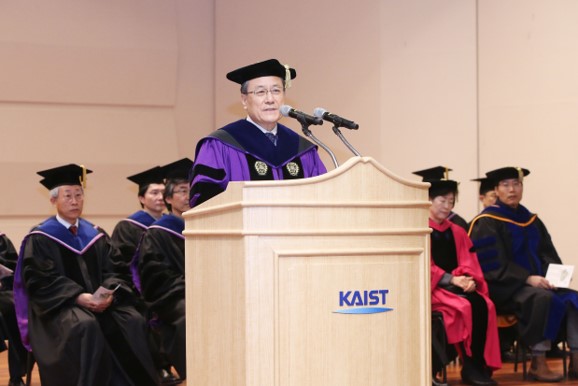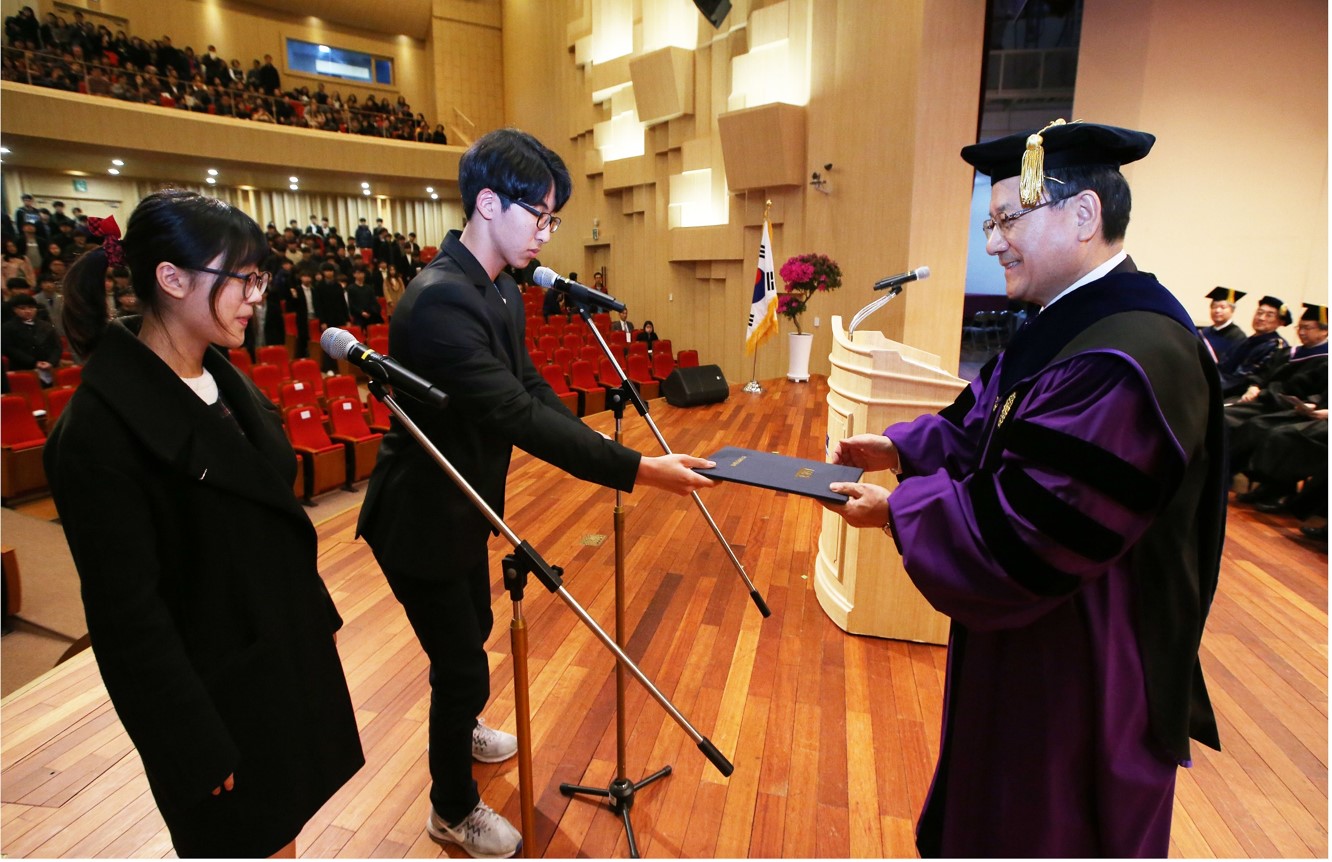policy

President Sung-Chul Shin welcomed 756 new undergraduates for 2017 during the Freshmen Convocation on February 27, urging them to be adamant in challenging themselves to become global leaders during the next four years and beyond at KAIST. Family, friends, faculty, and staff members cheered them on at the ceremony in the auditorium. The KAIST orchestra and chorus also celebrated the freshmen’s new start.
President Shin encouraged students to become global leaders by deepening their knowledge of basic studies as well as broadening their interdisciplinary spectrum while studying at KAIST.
“In the era of Industry 4.0, new discoveries will be made in interdisciplinary studies. Thus, I ask you to study humanities and social studies very diligently, the basis of creative research and development to broaden your knowledge spectrum. Conventionally, the science and technology fields are dominated by left-sided brains working while the humanities and social sciences are influenced by the right brain. KAIST will soon provide a new curriculum of full-brain teaching which will actively stimulate both sides of the brain. Such a new track will help students fully exercise their ingenuity, especially in comprehending the newest trends of science and technology,” he said.
He added, “Korea stands as one of seven most innovative nations with significant growth potential and the world is paying attention to us. You are the top 0.3 percent of science and technology talents in the nation who will be the leaders of our future. Thus, we plan to establish the Global Leadership Center in order to train our students to be outstanding leaders through their qualifications, manner, and mindset.”
He also cited communication skills as a critical aspect that every student, especially those majoring in science and technology, should focus on. “Communication is a critical tool for any scientist and leader. Students should study and learn how to better present themselves and deliver what they think more effectively and persuasively to others in the hyper-connected, horizontal society of the future. In particular, English communication skills are very crucial for engaging in leadership roles on the global stage.”
Finally, President Shin asked students to manage their time well in order to accomplish their goals. “Your future will be determined by what dreams you dream in college and how you prepare for it. I hope that your days at KAIST will be a time of diligent preparation for your ambitious dreams,” he added.
For full context of his speech, please click.

(Photo caption: President Shin makes a welcoming address at the 2017 Freshmen Convocation (above) and freshmen representatives present the oath of freshmen to President Shin.)
-
research KAIST researcher Se Jin Park develops 'SpeechSSM,' opening up possibilities for a 24-hour AI voice assistant.
<(From Left)Prof. Yong Man Ro and Ph.D. candidate Sejin Park> Se Jin Park, a researcher from Professor Yong Man Ro’s team at KAIST, has announced 'SpeechSSM', a spoken language model capable of generating long-duration speech that sounds natural and remains consistent. An efficient processing technique based on linear sequence modeling overcomes the limitations of existing spoken language models, enabling high-quality speech generation without time constraints. It is expe
2025-07-04 -
event King Saud University and KAIST discussed Strategic AI Partnership
<From left> President Abdulla Al-Salman(King Saud University), President Kwang Hyung Lee(KAIST) KAIST (President Kwang Hyung Lee) and King Saud University (President Abdulla Al-Salman) held a meeting on July 3 at the KAIST Campus in Seoul and agreed to pursue strategic cooperation in AI and digital platform development. The global AI landscape is increasingly polarized between closed models developed by the U.S. and China’s nationally focused technology ecosystems. In this context
2025-07-04 -
research KAIST Uses AI to Discover Optimal New Material for Removing Radioactive Iodine Contamination
<(From the Right) Professor Ho Jin Ryu, Department of Nuclear and Quantum Engineering, Dr. Sujeong Lee, a graduate of the KAIST Department of Materials Science and Engineering, and Dr. Juhwan Noh of KRICT’s Digital Chemistry Research Center> Managing radioactive waste is one of the core challenges in the use of nuclear energy. In particular, radioactive iodine poses serious environmental and health risks due to its long half-life (15.7 million years in the case of I-129), hi
2025-07-03 -
research KAIST Enhances Immunotherapy for Difficult-to-Treat Brain Tumors with Gut Microbiota
< Photo 1.(From left) Prof. Heung Kyu Lee, Department of Biological Sciences, and Dr. Hyeon Cheol Kim> Advanced treatments, known as immunotherapies that activate T cells—our body's immune cells—to eliminate cancer cells, have shown limited efficacy as standalone therapies for glioblastoma, the most lethal form of brain tumor. This is due to their minimal response to glioblastoma and high resistance to treatment. Now, a KAIST research team has now demonstrated a new th
2025-07-02 -
event 2025 KAIST Global Entrepreneurship Summer School Concludes Successfully in Silicon Valley
< A group photo taken at the 2025 GESS Special Lecture.Vice President So Young Kim from the International Office, VC Jay Eum from GFT Ventures, Professor Byungchae Jin from the Impact MBA Program at the Business School, and Research Assistant Professor Sooa Lee from the Office of Global Initiative> The “2025 KAIST Global Entrepreneurship Summer School (2025 KAIST GESS),” organized by the Office of Global Initiative of the KAIST International Office (Vice President
2025-07-01